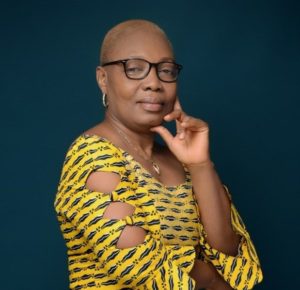Ms. Anita Kouvahey-Eklu on the issue of GBV in Togo
30 November 2022
 Ms. Anita Kouvahey-Eklu is the Deputy Country Director for Integrate Health in Togo and Heroine of Health 2022. On the occasion of 16 Days of Activism against Gender-Based Violence, Women in Health reached out to Ms Kouvahey-Eklu about the problem of gender-based violence in Togo, her native country. As an experienced medical provider and advocate, she has championed LGBTQIA+ rights, women’s rights and Universal Health Coverage there for more than two decades. The following is a summary of Ms Kouvahey’s points.
Ms. Anita Kouvahey-Eklu is the Deputy Country Director for Integrate Health in Togo and Heroine of Health 2022. On the occasion of 16 Days of Activism against Gender-Based Violence, Women in Health reached out to Ms Kouvahey-Eklu about the problem of gender-based violence in Togo, her native country. As an experienced medical provider and advocate, she has championed LGBTQIA+ rights, women’s rights and Universal Health Coverage there for more than two decades. The following is a summary of Ms Kouvahey’s points.
Can you tell us a bit about the problem of GBV in Togo, how prevalent is it?
In Togo, just like in other sub-Saharan countries, gender-based violence is very much present and deeply embedded in the patriarchal culture and social norms of the country. Togo’s Demographic and Health Survey 2013-2014 reveals that 29 percent of women aged 15-49 have experienced physical violence from an intimate partner or husband. Some 11 percent report having experienced some sort of sexual violence at one point in their lives. Finally, 28 percent of women surveyed consider that being hit by their husbands is justified in several cases for example, burning a meal, leaving the house without permission, refusing to engage in sexual intercourse.
The results of this survey clearly show that in Togo, the idea of gender-based violence deeply affects women. In many cases, it is limited to their relationship with their husbands and is widely normalized by women themselves.
It is important to note that the government has deployed various strategies, policies and programs to protect women and defend their rights in line with international standards. Yet, despite progress on the issue, the narrow definition of GBV in Togo means that many are excluded from these efforts.
The LGBTQI+ community is especially vulnerable as discussions about sexual orientation in Togo are almost non-existent. This leads to much suffering and injustice for a population that lacks legal recognition and has no legal remedies with regard to the violation of their fundamental rights.
What impact does gender-based violence have on women that you see?
Most of all GBV is present in women’s daily lives. At home or within their communities, the law is disregarded, and local norms and traditions take over. This is where the deepest injustices and violations of women’s rights occur.
What are you working on in GBV?
I’m an activist and I’m convinced that everyone’s basic fundamental rights should be respected. That’s why my work focuses on supporting groups and individuals. I use my skills as an educator in sexual and reproductive health, HIV and GBV to organize trainings for people and gender-focused organizations to identify at-risk behaviors and enable women to safely access the care they need.
My work is focused on:
-Capacity development of gender-focused organizations
-Support with project development and funding
-Coaching members of these organizations in sexual and reproductive health
What is your top ask of governments?
The government must strengthen the legal framework and support civil society organizations in the fight against gender-based violence. The organizations in turn must train, educate and sensitize community members to take ownership of the legal framework against GBV. They must implement actions and mechanisms within their communities guaranteeing the preservation of rights and respect for gender-based diversity.
Read more: Heroine of Health 2022 Awardee, Ms. Anita Kouvahey-Eklu